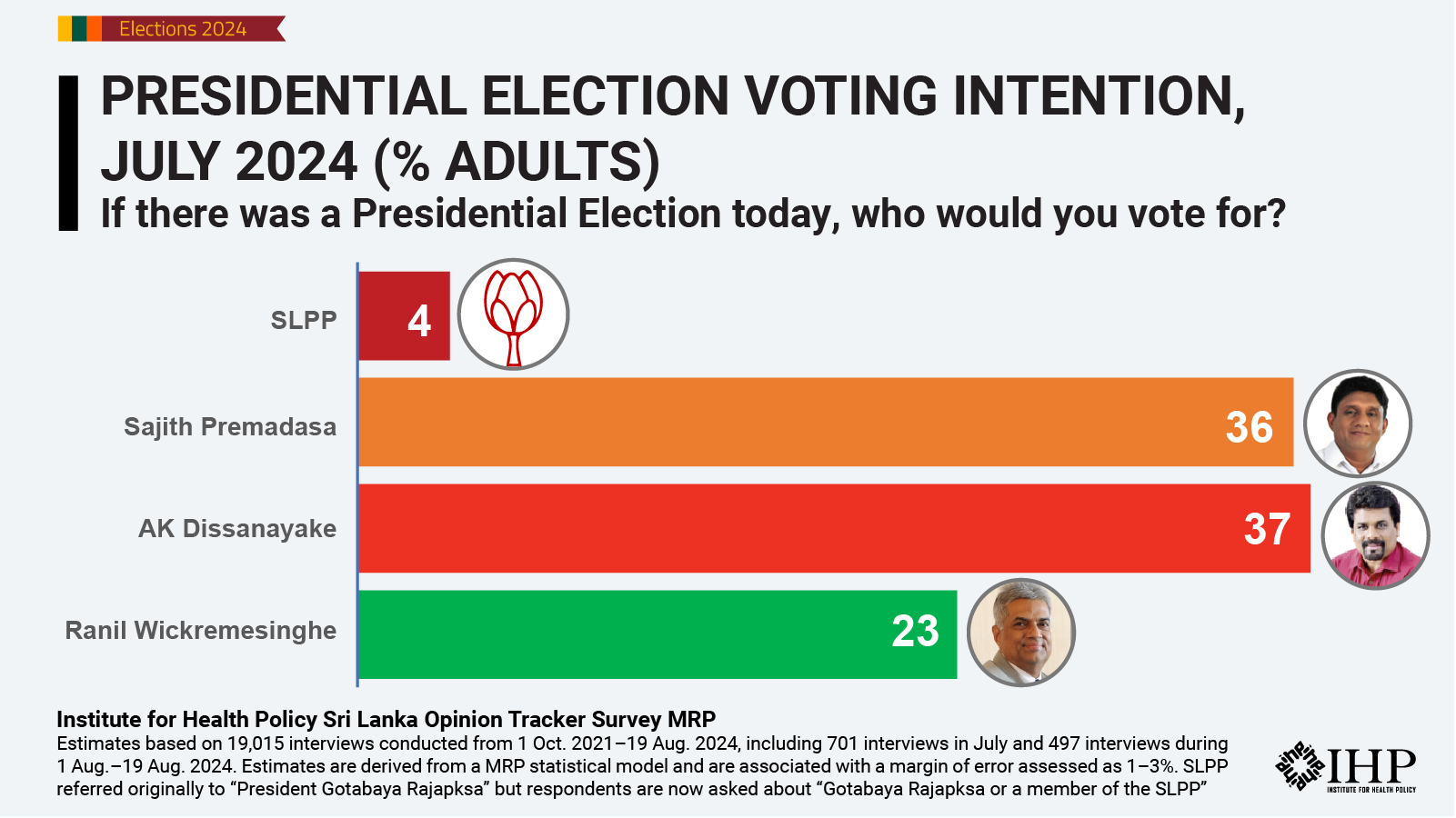IHP MRP Presidential Election Update July 2024
IHP’s Sri Lanka Opinion Tracker Survey (SLOTS) MRP provisional estimates of Presidential Election voting intent for July 2024 show NPP/JVP leader AK Dissanayake and SJB leader Sajith Premadasa leading neck and neck (37% and 36% each within the margin of error) but with both at less than 40% of all adults.

At the same time, July saw a continuing surge for President Ranil Wickremesinghe, whose support grew to 23%. Support for a generic SLPP candidate remained unchanged at 4%, with Namal Rajapaksa only declaring as a candidate in August.
Analysis of the June–July estimates indicates some differences in who is supporting each candidate. Support for AKD was strongest in the youth, a majority of whom supported him (54%), as well as among Sinhala voters (41%) and the most affluent third of voters (42%). In contrast, Sajith Premadasa led among the poorest third of voters (42%) and among minorities (51% in Sri Lankan Tamils and 65% in Muslims).
President Wickremesinghe’s support increased with age, reaching 38% in those aged 60 years and older, and he obtained more support amongst women (26%) than in men (17%). Otherwise, his support was mostly evenly distributed across other demographics.
SLOTS polling director, Dr Ravi Rannan-Eliya, noted that: “AKD’s strength is due not only to support amongst the young, but also to winning the biggest share of disaffected Gotabaya voters. President Wickremesinghe’s initial strength has also been due to support from that same group since he was only picking up one in five of voters who supported Sajith Premadasa in 2019.”
These estimates use the IHP SLOTS Multilevel Regression and Poststratification (MRP) model (01/2024 revision). This update is for all adults and uses data from 19,015 interviews conducted from Oct. 2021 to 19 Aug. 2024, including 701 interviews during July 2024, and 497 interview in August. One hundred bootstraps were run to capture model uncertainty, with margins of error assessed at 1–3% for July. IHP is planning to expand its interview numbers in the coming weeks and hopes that its next estimates will be more robust.
IHP’s SLOTS MRP methodology first estimates the relationship between a wide variety of characteristics about respondents and their opinions – in this case, ‘If there was a Presidential Election today, who would you vote for?’– in a multilevel statistical model that also smooths month to month changes. It then uses a large data file calibrated to the national population to predict voting intent in each month since Oct. 2021, based on what the multilevel model indicates about their probability of voting for various parties (‘post-stratification’) at each point in time. The multilevel model was estimated 100 times to reflect underlying uncertainties in the model and to obtain margins of error. The voting intent results for previous months have changed in this update as more data were collected after the last release and these changes are within the margin of error.
About IHP
IHP is an independent, non-partisan research centre based in Colombo, Sri Lanka. The SLOTS lead investigator is Dr Ravi Rannan-Eliya of IHP, who has trained in public opinion polling at Harvard University and has conducted numerous surveys over three decades.
Methodology
SLOTS combines interviews from a national sample of adults (ages 18 and over) reached by random digit dialling of mobile numbers, and others coming from a national panel of respondents who were previously recruited through random selection. IHP estimates voting intent using an adaptation of Multilevel Regression and Post-Stratification (MRP), with multiple imputation to account for uncertainties in its modelling, exploiting data from all SLOTS interviews to estimate voting in a particular month.
